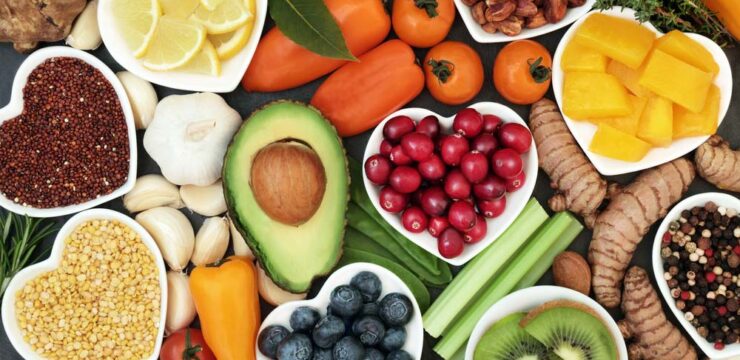Losing weight doesn’t have to be a painful or extreme process. Many people believe that weight loss means enduring hunger,
restrictive diets, and drastic lifestyle changes. However, sustainable weight loss is more about making small,
manageable changes that promote long-term health, rather than starving yourself or relying on fad diets.
This article explores how you can lose weight without experiencing hunger pangs or deprivation, focusing on healthy, balanced eating habits that support a well-rounded lifestyle.
1. Understand the Importance of a Balanced Diet
The key to losing weight without feeling deprived is understanding the importance of a balanced diet. Instead of eliminating entire food groups or drastically cutting calories, focus on consuming a variety of whole, nutrient-dense foods that provide essential vitamins, minerals, protein, healthy fats, and fiber. These nutrients not only nourish your body but also keep you feeling full and satisfied, reducing the urge to snack excessively.
Include these food groups in your diet:
- Fruits and Vegetables: High in fiber and low in calories, they provide essential vitamins and minerals.
- Lean Proteins: Foods like chicken, fish, eggs, beans, and legumes help repair muscles and maintain a feeling of fullness.
- Whole Grains: Brown rice, quinoa, oats, and whole wheat bread are excellent sources of fiber and energy.
- Healthy Fats: Avocados, nuts, seeds, and olive oil provide healthy fats that are satiating and essential for overall well-being.
By eating a variety of foods from these groups, you’ll avoid feeling restricted and maintain the energy levels necessary for exercise and daily activities.
2. Practice Portion Control
One of the most effective ways to lose weight without starving yourself is by practicing portion control. Overeating—even healthy foods—can prevent weight loss. Use smaller plates, bowls, and utensils to encourage mindful eating. You can also measure out servings, especially for high-calorie foods like nuts or oils, to avoid mindlessly consuming extra calories.
Additionally, it’s important to listen to your body’s hunger cues. Eat when you’re hungry, and stop when you’re satisfied, not when you’re full. This can help you regulate your food intake while avoiding emotional eating or overeating out of habit.
3. Hydrate Properly
Drinking enough water is often overlooked but is crucial for weight loss. Sometimes, our bodies mistake thirst for hunger, leading to overeating. Aim to drink at least 8 cups of water a day, or more if you’re active. Drinking a glass of water before meals can also help you feel fuller, preventing overeating.
Infusing your water with a slice of lemon, cucumber, or mint can make it more enjoyable and encourage you to drink more throughout the day. Herbal teas can also be a great option for variety without added calories.
4. Make Smart Snacking Choices
Snacking doesn’t have to derail your weight loss efforts. In fact, having healthy snacks on hand can prevent you from getting overly hungry and making unhealthy food choices later. The key is to choose snacks that are both nutritious and satisfying.
Healthy snack ideas include:
- Fresh fruit (e.g., apple slices with almond butter)
- Greek yogurt with chia seeds and berries
- A small handful of mixed nuts
- Veggies with hummus
- Hard-boiled eggs
These snacks are not only rich in nutrients but also provide protein, healthy fats, and fiber, all of which help you stay full longer.
5. Stay Active
Exercise plays a crucial role in healthy weight loss. However, you don’t have to go to the gym for hours to see results. Regular physical activity, even in the form of daily walks or stretching, can significantly impact your metabolism and help you burn calories.
Aim for at least 150 minutes of moderate-intensity activity or 75 minutes of vigorous-intensity exercise per week. This could include activities like brisk walking, cycling, swimming, or strength training. Incorporating movement into your daily routine will support your weight loss goals and help maintain lean muscle mass, which is key to a healthy metabolism.
6. Prioritize Sleep and Stress Management
Weight loss isn’t only about what you eat and how much you exercise—it’s also about how well you take care of your overall health. Poor sleep and chronic stress can lead to overeating, sugar cravings, and a slower metabolism. Prioritize getting 7-9 hours of sleep each night, and practice stress-reducing techniques such as meditation, deep breathing, or yoga.
When you’re well-rested and less stressed, your body can regulate hunger hormones better, making it easier to control cravings and make healthier food choices.
7. Avoid the All-or-Nothing Mindset
One of the biggest mistakes people make when trying to lose weight is thinking they need to follow an “all-or-nothing” approach. If you slip up and eat something outside of your plan, it’s easy to fall into the trap of thinking you’ve ruined your progress. Instead, focus on balance and flexibility. It’s okay to indulge every once in a while, as long as it doesn’t become a regular habit.
The goal is to make healthier choices consistently while still enjoying life’s pleasures. A sustainable approach to weight loss means allowing yourself the freedom to enjoy your favorite foods in moderation without guilt.
Conclusion
Weight loss without starvation is possible when you adopt a balanced approach to eating and living. Focus on nourishing your body with a variety of nutrient-dense foods, controlling portions, staying hydrated, and incorporating physical activity into your routine. By making small, sustainable changes, you can lose weight, maintain a healthy lifestyle, and feel great without the need for extreme diets or deprivation.
Remember, it’s not about quick fixes or drastic measures—it’s about creating lasting habits that support your long-term well-being. Stay patient with yourself, trust the process, and celebrate the progress you make along the way.

